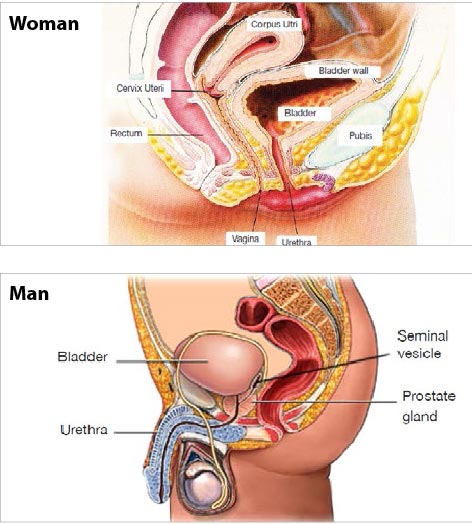Radiation on the abdominal and pelvic areas can sometimes cause side effects. You may or may not experience adverse effects. The effects and their severity vary from person to person.
This sheet contains detailed information about potential side effects and ways to deal with them. Generally, these effects appear in the 3rd week of treatment and can affect all organs located in the treated area. These trends becomes more acute at the end of treatment.
EFFECTS ON THE BLADDER:
- Urinary burning
- Frequent urination
- Pelvis pain
- Occasional blood in urines

EFFECTS ON THE DIGESTIVE SYSTEM:
- Nausea and vomiting if the epigastrium is in the radiation field
- Intestinal spasms
- Diarrhoea or mucus stools
- Tenesmus
- Blood in stools
- Anus irritation, such as haemorrhoids
EFFECTS ON THE SKIN:
Skin irritation happens mostly on pleats (buttocks and groin). These irritations begin with erythema and progressively become superficial weeping burns. Ask your radiation oncologist before applying any cream on irritated skin.
FATIGUE:
Feeling tired does not mean that your condition is deteriorating. Possible causes are: the sickness itself, the change in your daily activities, the repetition of your daily treatment, weight loss, diarrhoea, nausea, vomiting, and treatments you have received (surgery, chemotherapy…).
If you feel easily-tired, tell your radiation oncologist what are your symptoms. Most of the time, they can be treated.
PRACTICAL ADVICE:
To reduce diarrhoea, follow a diet poor in fibres (avoid vegetables, beans, bread). Avoid fatty, spicy foods, alcohol and icy foods (see chart on back).
To reduce bladder irritation drink a lot of water (1.5 to 2 litres per day) from the first day of your treatment, and do as much exercise as your condition allows
You may or may not experience the above side effects.
Most feelings of irritation and congestion will progressively disappear a few weeks after the end of your treatment.

Tell the therapeutic radiographers or your radiation oncologist about any unusual side effects you may have to receive appropriate treatment.
Ask your radiation oncologist any further question you may have experienced.

 Vi
Vi 












